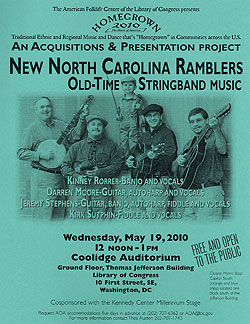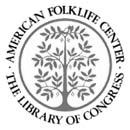| |
|||
|
The American Folklife Center at the Library of Congress presentsThe Homegrown 2010 Concert Series
|

|
The industrialization of the Piedmont region of North Carolina and Virginia during the late nineteenth and early twentieth centuries resulted in the migration of many rural residents to towns and cities. The textile industry in particular experienced huge growth during this era and mill owners recruited mountain and piedmont farm families to take jobs in the mill as spinners, spoolers, doffers, and weavers. These workers brought their rural music traditions and were exposed to other musical influences in the environment of the mill village. For textile mill workers, music functioned both to preserve the memories of a rural, self-sufficient lifestyle and to reflect newer popular tastes and cultural mores that were prevalent in urban, industrialized communities.
Mill worker Charlie Poole was a musician who drew upon older fiddle music traditions as well as newer blues, ragtime and Tin Pan Alley songs. Poole finger-picked the banjo and possessed a distinctive singing voice. He entertained other mill workers in and around Spray, North Carolina with his string band, the North Carolina Ramblers. The popularity that the band enjoyed inspired the group to travel to New York in 1925 to audition for Columbia Records. Their try-out was successful and the Ramblers' first recording session included a ragtime-influenced song entitled "Don't Let Your Deal Go Down." "The Deal" became a best seller and launched Poole on a successful career as a professional musician. From 1925 through 1930 he recorded eighty songs and dance tunes and approximately 600,000 of his recordings were bought by an eager public, an impressive figure for the times. His performances with fiddler Posey Rorer and guitarist Roy Harvey are considered some of the finest examples of Southern stringband music documented in the formative years of the commercial recording industry. Poole might well have gained a national reputation had he not died suddenly in 1931 at the age of 39.
Kinney and Doug Rorrer, nephews of Charlie Poole and Posey Rorer, formed the New North Carolina Ramblers in the 1960s. Over the years, their band has featured many old-time musicians from North Carolina and Virginia but Kinney Rorrer, who sings and plays the banjo in the same three-fingered picking style as Charlie Poole, has always led the group. Today, the group consists of Kinney, Kirk Sutphin, Darren Moore, and Jeremy Stephens.
Kinney Rorrer grew up in Danville, Virginia in a family whose members still depended upon textile mills for a livelihood. Instead of taking a permanent job in the mill, Kinney became a teacher. He also made it a point to visit many of the musicians who were contemporary with Charlie Poole and has assembled an impressive array of interviews, recordings and artifacts associated with regional music traditions. Rorrer has written a biography of his greatuncle entitled Ramblin' Blues: The Life and Songs of Charlie Poole. He currently co-hosts a radio program of bluegrass and old-time music, Back to the Blue Ridge, that features recordings of early country music artists.
Kirk Sutphin learned stringband music at an early age. Kirk Sutphin apprenticed himself to fiddler Tommy Jarrell of Mount Airy, North Carolina and also spent time with Lonnie Austin, who recorded with Charlie Poole and the North Carolina Ramblers in the 1920s. An excellent banjo player as well, Kirk recently participated in the Music From the Crooked Road Tour presented by the National Council for the Traditional Arts.
Jeremy Stephens and Darren Moore, the youngest members of the band, were born in an era when textile mills were closing or moving overseas. Nevertheless, they gravitated to the music made by Charlie Poole and other musicians who came out of mill culture. In addition to their impressive abilities as instrumentalists, Jeremy Stephens and Darren Moore have a passion for the Carter Family and perform many of their songs. Through his website, Jeremy's Saggy Record Cabinet.![]() Jeremy Stephens also assists fans of early country music and bluegrass who are seeking hard-to-find recordings.
Jeremy Stephens also assists fans of early country music and bluegrass who are seeking hard-to-find recordings.
The New North Carolina Ramblers have performed in recent years at MerleFest, the Smithsonian Folklife Festival and the National Folklife Festival and have two CD recordings, Cotton Mill Blues and Four and A Half, on the Old Blue label.
— Wayne Martin
 The American Folklife Center was created by Congress in 1976 and placed at the Library of Congress to "preserve and present American Folklife" through programs of research, documentation, archival preservation, reference service, live performance, exhibition, public programs, and training. The Center includes the American Folklife Center Archive of folk culture, which was established in 1928 and is now one of the largest collections of ethnographic material from the United States and around the world. Please visit our web site.
The American Folklife Center was created by Congress in 1976 and placed at the Library of Congress to "preserve and present American Folklife" through programs of research, documentation, archival preservation, reference service, live performance, exhibition, public programs, and training. The Center includes the American Folklife Center Archive of folk culture, which was established in 1928 and is now one of the largest collections of ethnographic material from the United States and around the world. Please visit our web site.
| ||||
